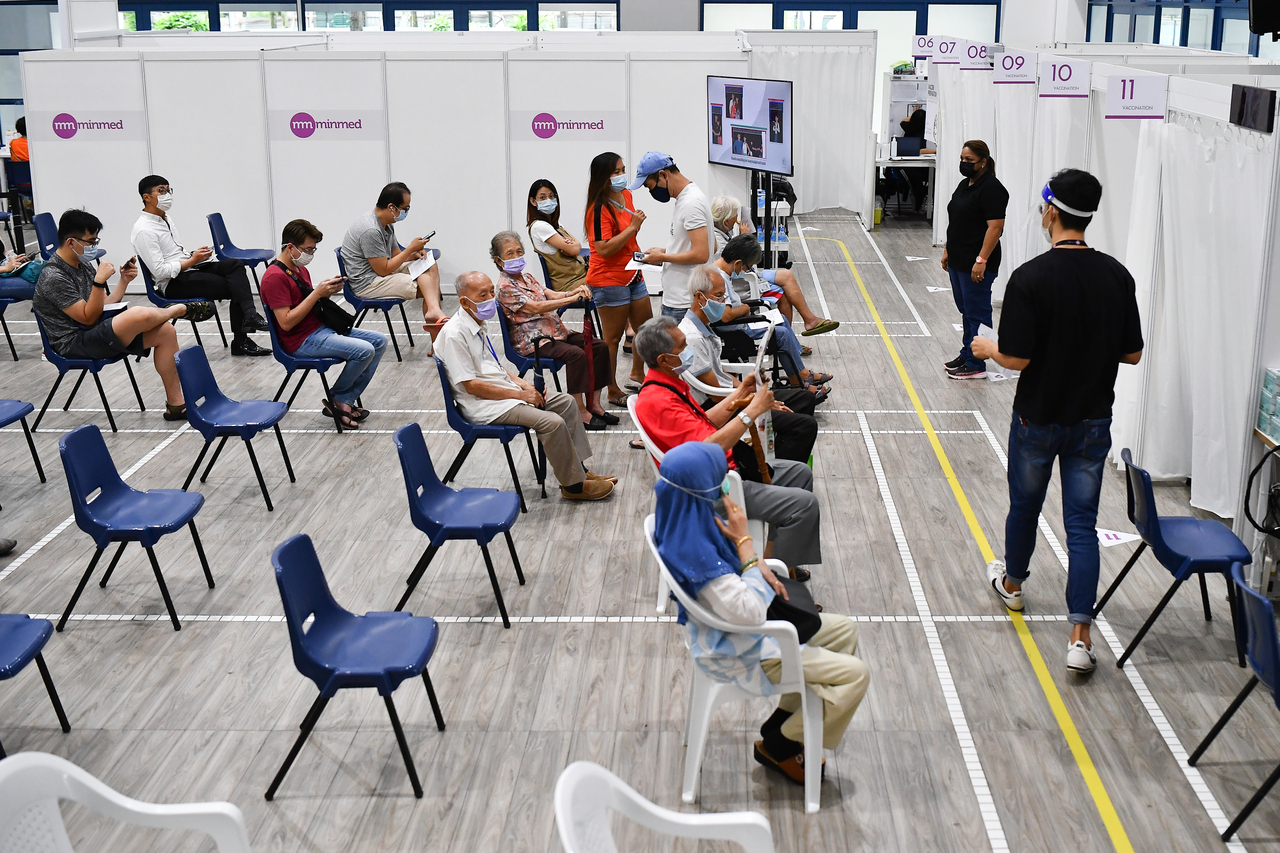Covid-19 vaccination milestone of 80% may see further easing of restrictions: Experts
Sign up now: Get ST's newsletters delivered to your inbox

People wait in the observation area after receiving their Covid-19 vaccines at Toa Payoh West Community Club on Aug 16, 2021.
ST PHOTO: LIM YAOHUI
Follow topic:
SINGAPORE - Covid-19 restrictions could be eased further, now that eight in 10 people have been fully vaccinated, although loosening would have to be in phases as there are still unvaccinated people at risk, said experts.
Professor Dale Fisher, a senior infectious diseases consultant at the National University Hospital (NUH), said on Sunday (Aug 29) that while crossing the milestone of having 80 per cent of the population vaccinated is a "remarkable achievement", there is no need to rush to lift restrictions all at once, as the phased reopening strategy has been working.
"We have waited for the vaccine to lead us out of the pandemic, and now we need to let it do so and trust that the high immunity levels will do their job. There is no appetite to be rash and have a freedom day with removal of all restrictions at once," he said.
He noted that Singapore has to take some "bold steps", now that the majority of people are vaccinated.
"I can see it will be hard to let go of many activities, but mass testing of asymptomatic vaccinated people and quarantining those who test positive impact the economy and people's mental health," said Prof Fisher.
"Fundamentally, we need to get more comfortable with not identifying every case and focus on protecting the vulnerable rather than identifying every case and stopping spread."
On Aug 6, Finance Minister Lawrence Wong said one of the criteria for moving on to the second phase of the country's four-stage plan towards becoming Covid-19-resilient and reopening was an 80 per cent vaccination rate.
Singapore is currently in the first stage, a preparatory phase which is expected to last until early September, during which some border restrictions are being eased.
Singapore will then move into the second stage, known as "transition stage A", which would see further economic reopening. But this is premised on a high vaccination rate and stable overall situation, with no surges that threaten to overwhelm the healthcare system, Mr Wong said.
Professor Teo Yik Ying, dean of the National University of Singapore's Saw Swee Hock School of Public Health, said that Singapore's healthcare system is "very much in control" of the situation, despite the recent Covid-19 outbreaks at Bugis Junction and North Coast Lodge workers' dormitory, as well as the number of Covid-19-related deaths this month.
The number of cases hospitalised with severe disease and requiring either oxygen or intensive care is stable, he said, and higher case numbers have not translated to rising demand for advanced hospital care.
"This is exactly the evidence that shows vaccination is able to reduce the severity of Covid-19 infection, and with high vaccination uptake in the population, we are well poised to relax restrictions even further," said Prof Teo.
Professor Paul Tambyah, a senior infectious diseases consultant at NUH, expressed similar sentiments. He said: "The important thing is that the impact on our society and healthcare system, despite having around 100 new locally transmitted cases daily for the last few days, has been minimal, with few patients in ICU (intensive care unit) or dying every day, thanks to our high vaccination rates."
He said that restrictions on family visits, dormitory residents and dining at hawker centres and coffee shops should be loosened, as these "appear to be causing among the greatest hardship to the largest number of people without a really significant impact on public health".
Nanyang Technological University's Lee Kong Chian School of Medicine associate professor of infection and immunity Luo Da Hai said that while vaccination alone is not the "magic bullet", it provides much-need protection against emerging virus variants.
However, there is still a need to retain the same vigilance as in the early days of the pandemic, because there are still unvaccinated people who remain vulnerable to the virus, he added.
In announcing the vaccination milestone in a Facebook post on Sunday, Health Minister Ong Ye Kung said: "Singapore has taken another step forward in making ourselves more resilient to Covid-19."
Mr Ong also said more than 4,300 housebound individuals had received their Covid-19 jabs from home vaccination teams.
The Health Ministry receives about 700 requests for home vaccinations each week. It has tripled its home vaccination teams from 11 to 33 teams with help from 200 volunteer doctors and nurses and the Singapore Armed Forces, he said.
As a result, waiting time has been halved from eight weeks to four, he added.
"We aim to complete all home vaccinations by end-September. That will be another important step forward," he said.

